Theater and film are public platforms where audiences engage intimately with issues in a rare experience of collective reflection. During this, a confrontation occurs between a person — the playwright or screenwriter — and the world. When this confrontation becomes a film or a play, everyone participates, exploring the sources of pain within themselves, in an experience that has the potential to bring people closer together.
The social relations of contemporary playwright and screenwriter Doruntina Basha, a Prishtina native, are shaped by determining what a large group of people, an audience, will or should deal with.
By centering women’s experiences, Basha challenges the theater and film scene, which is still dominated by men and where women’s voices and experiences have been silenced, erased or misrepresented. Basha has used her platform as a playwright and screenwriter to document the overlooked biographies of women through her deeply political body of work. Her 2011 play “The Finger” deals with the consequences of war through the relationship between a daughter-in-law and mother-in-law. The 2021 film “Vera Dreams of the Sea” explores the legacy of women in poverty and their unrecognized efforts to fight inequality. Her 2021 play “Stiffler” looks at institutional disregard for gender-based violence and femicide through a sex worker.
“In Kosovo, in a deeply patriarchal society like ours, placing a woman at the center of a story and presenting her intimate world to the public is a political act. Because the woman is never considered as a subject, there’s no real interest in her life,” she said.
Theater and film’s role in documenting history has been widely recognized and cultivated, especially in politically difficult contexts, where these two platforms have been instrumentalized to maintain a certain national image or sentiment. This has usually coincided with patriarchal and nationalist definitions of the nation. However, more and more films and plays represent the voices and experiences of women — stories generally perceived as insignificant, but perhaps the only ones that can lead the public on a path of facing its own worst acts, like gender-based violence, femicide and erasure of women from history.
Being a woman in a patriarchal society, Basha experiences the multilayered and institutionalized oppression — even in cultural institutions — against women in Kosovo. However, her plays and screenplays are her way of transforming and documenting her own pain.
K2.0 spoke to the internationally awarded playwright and screenwriter about theater, politics, confronting society with its own truths, bringing women’s narratives from the periphery to the center and the search for small but significant stories.
K2.0: Theater and film are very public platforms, while you as an artist are just a human. So, you must have a personal starting point for writing something. How do you manage to maintain the distance or boundary between personal sentiment and creating something that resonates universally and is communicated to many?
It’s nothing new to say that everything begins with a tease. It can be a simple motif, an idea for a character, or even the topic itself that triggers you. The works I have done so far have all resulted from very personal inspirations that enabled the creative process.
As for the question of where the distance is, or boundary is, I have no idea. It’s a bit like walking in the darkness or playing the game of hide and seek. It’s kind of a liberating feeling when you don’t have to worry too much whether the boundary exists or not. I’ve never thought about it and honestly, now that you asked me, I’m thinking and asking myself why I feel so comfortable opening myself up to the public, given that in daily life I’m a more private person.
Perhaps the ultimate purpose of drama is staging. It is not typical literature that you sit down and read, as it has external frameworks and limitations. Could this be suffocating for your inner self?
Limitations can be suffocating at first because dramaturgy is, in itself, formal. I have studied dramaturgy and one of the academic goals is to make you learn the structure, or formulas, in addition to the history and context. Such things may or may not be useful. But over time, you no longer feel the weight of the form. Or at least in my case. The more I work, the less I feel like I’m working in a format that has rules.
Meanwhile, words start having more weight. For me, words have always been the most important. Words were my first love with the theater since the first plays I read were from the French theater of the absurd, where wordplay is characteristic. On the other hand, dramaturgy is also a mastery, like a craft in the way you read a book or tell or listen to a story. It is also a method of understanding your past and projecting your wishes for the future.
But, the dramaturgical material, whatever it is, a film script or a play, is only the starting point that then transforms into a film or a theater production…
Theater and film have the same purpose, producing something that ultimately can be shared with the audience, but they differ. Film is different because it is more fixed. Personally, I feel better when I write for the theater, because I feel more freedom, I feel more independent. The screenwriting process is completely collaborative, you’re never alone. Despite the fact that you probably do most of the work yourself, you are still not alone because there are many people involved in the process at different stages and with different functions. There are also many rules as the production must always be taken into account.
A screenplay requires a kind of rationality that theater does not necessarily require. It requires a logic in developing the narrative that is different from in the theater. The script is written for film, and film is a medium conditioned by how and why people watch the film. So, apart from the creative team involved in the process of writing a script, you also have the burden of responsibility towards the audience you are writing for.
In the theater these limitations do not exist. Or they exist, but I don’t think about them in my work. In theater, for me it’s more important to write than to think.
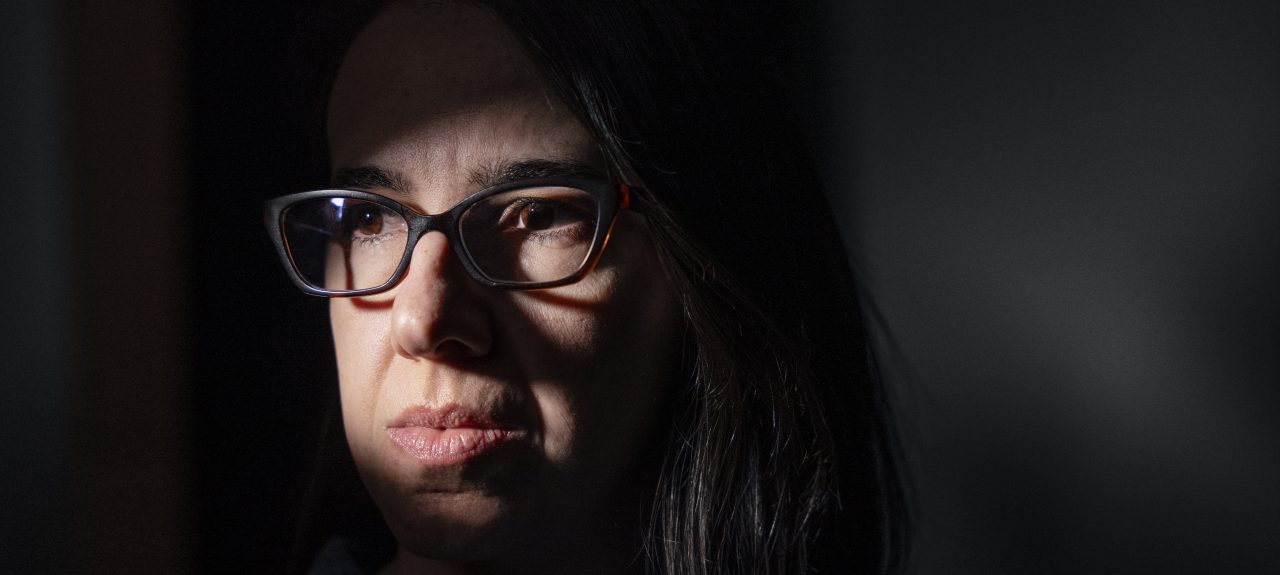
Photo: Majlinda Hoxha / K2.0
If I don't agree politically with the work requirements, I don't take it on.
It seems to me that we talk very little about the psychology of the public. We rarely talk about how, as a creative, your art can define social relationships and interactions. How does it affect you to always be very aware of everything around you?
While having fun with friends, I often say that I feel like I’m in a strict observation mode, as if I’m constantly doing some kind of research. Maybe it has to do with the will to understand, or create something for others. Of course, I would love for what I create to become part of positive change. After all, isn’t this some kind of motivation?
The persistent presence in each moment or change in society is an integral part of my working process. If the way I write is very impulsive and fragmented, then my daily experience or sentiment about what is happening around me rewards the process by creating connections and gives my work a completely unexpected direction.
Do you ever have a moment of personal compromise during this observation? Let’s take as an example a woman who’s part of your life, friend or relative. Do you ever take her, separate her from yourself and see her as a potential character?
I don’t base my characters on people I know. I draw inspiration from the people around me and the people I meet. But I create the characters from a combination of different things: a little from my personal experience and stories, a bit from the habits and features of the people that surround me and words that I remember, maybe they don’t even carry much weight, but simply have been registered somewhere. A large part of the characters come out from the research process. And then when the writing process begins, they spontaneously come to life.
The purpose of a film or play is often to provoke debate, reflection and thought. Do you feel this responsibility when you start writing something? Do you have a distance towards this when you do a work that’s commissioned?
I will start from this last part because it’s important. The essence of a successful commissioned or ordered work comes from shared social values and principles. Normally, personal inspiration is just as important, but if I don’t politically agree with the requirements of the work, I don’t take it on.
For example, the play “Stiffler” was commissioned. The idea was to write a drama about sex workers. When I started thinking about sex workers in Kosovo, I immediately faced the essential problem: the concept of sex workers does not exist because sex work is criminalized. Thus, the purpose of this project became addressing the problems that arise precisely from the denial or lack of recognition of this type of job. Naturally, this made me think about many situations of women in Kosovo, about the many absences that characterize women’s lives in general. When I started thinking about women in general and trying to find the common denominators, I came to the idea of femicide. That if there is something that unites all the women in the world, it is the thought that someone, a man, one day, might want to kill them and could kill them.
So, in this way “Stiffler” became a way of confronting the audience with femicide, from the perspective of a sex worker, who no one considers as a worthy subject in our society. The purpose was to provoke debate, reflection, or even a single reaction. We wanted to shake the very comfortable chairs from where, while sitting, we have become spectators of the murders of women that happen every day and often in the hands of the institutions that are meant to protect them.
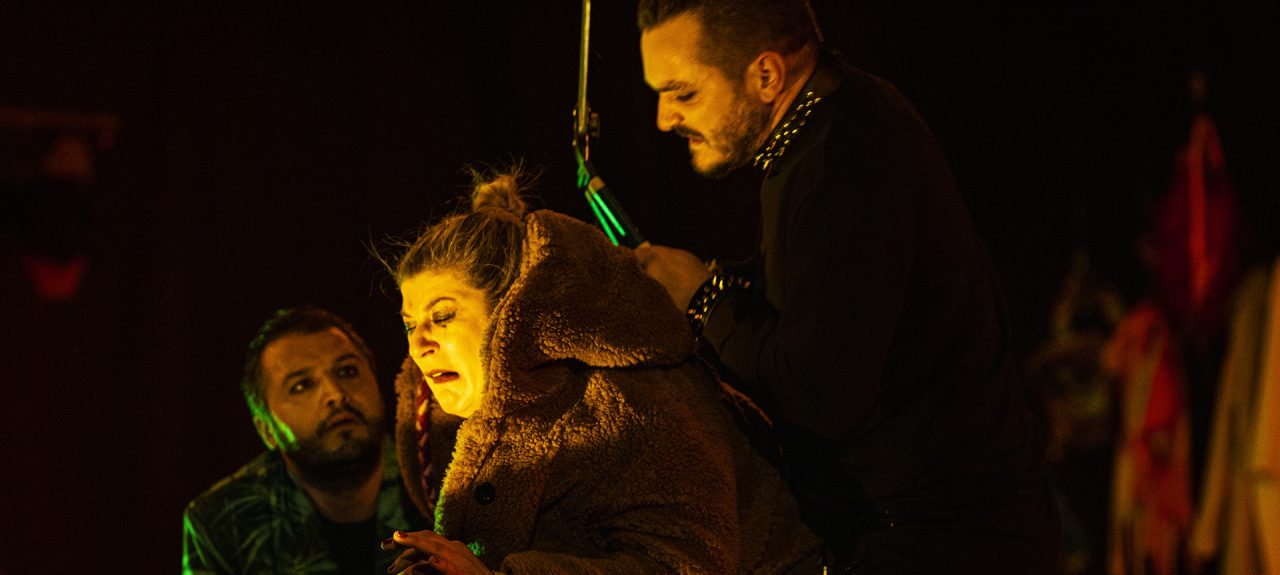
Stills from the show "Stiffler," first staged on December 4, 2021, at the ODA Theater in Prishtina. Playwright: Doruntina Basha, director: Kushtrim Koliqi. In the role of Hava, Rebeka Qena, in different main roles: Adrian Morina and Armend Smajli.
Credits: Photo by Integra.
Do you ever ask yourself “Who am I, to open the eyes of others about an issue that concerns me and that should concern everyone?”
No, I don’t ask myself that question because when I write, I always write from a woman’s perspective. This means that in addition to creating a story, I also document the act of this creation. Nowadays, women creatives all over the world, especially in societies like ours where women are still challenged in basic aspects of life, such as education, are weaving important threads that can start traditions. These threads can also connect the fragmented or missing pieces of a tradition that has never had the chance to be fully developed.
So I never ask myself who I am, because, at the end of the day, the most important thing for me is the act of documenting, which we are doing for a specific experience, as a woman in Kosovo, the Balkans, Europe, the world… It’s more like an internal cause that’s very personal to me.
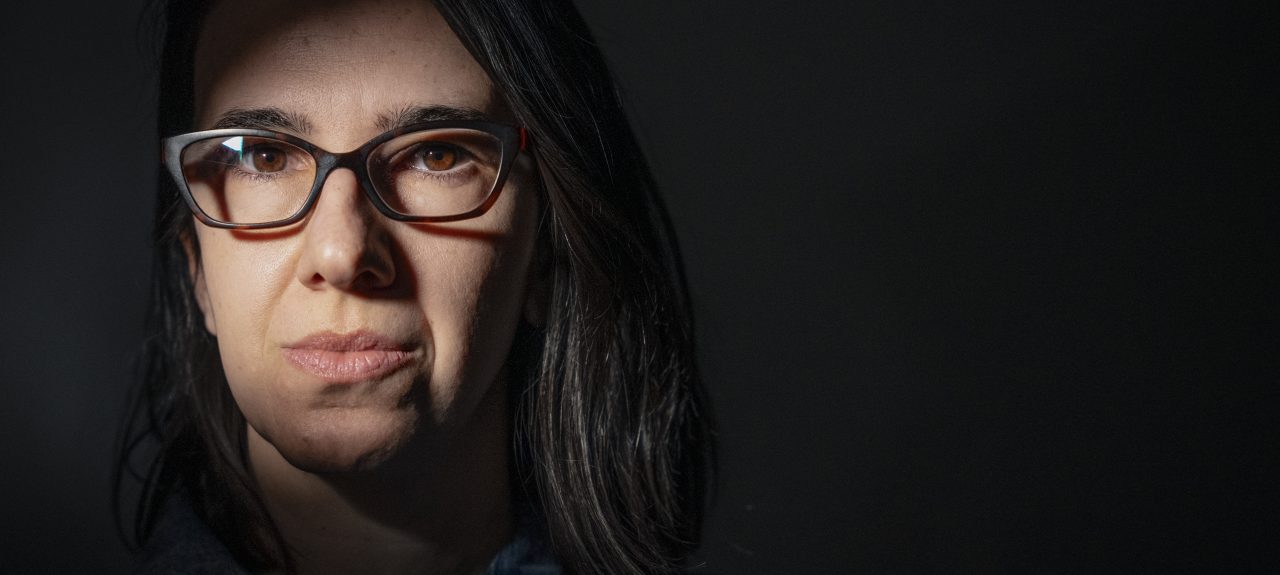
Photo: Majlinda Hoxha / K2.0
There is something very poetic in the way that theater transforms people into very soft and silent beings, who stay in darkness, without speaking and watch with great attention something fictional in front of them.
Having such a large public platform can be a great privilege that allows you to push your cause forward. However, you are also a woman in this society, subject to the many layers of oppression. How do you handle your pain in light of this positionality?
The pain is transformed as you create a play about something specific. Then you go and sit [to watch the play] and you can identify the words that have significant meaning in your life and they are intertwined with the experiences of other women. For me, it is an act of transformation when you sit down and look at the drama and you realize that you have managed to put your pain on a slightly bigger map and now the pain exists on that map. That map has become a part of something, part of a consciousness. It’s out there, it’s a transformative act. It is enough to sit down in the hall and see the audience watching and listening attentively to the drama that you have written and that’s being played in front of them. There is something very poetic in the way that theater transforms people into very soft and silent beings, who stay in darkness, without speaking and watch with great attention something fictional in front of them.
You are one of the few women who have managed to reach this platform and some of your plays deal with microsociological and microhistorical themes. Did you feel compelled to address all these issues as soon as you could? Was there a concern that you might lose access to this platform in the future?
A very interesting question. It is understandable, this also has to do with the fact that we have historically been denied access to the platform. It is like some kind of trauma that we carry with us.
In the theater I am very minimalist, because the theater is a very artistic and poetic creation. It’s like I have an alter ego that takes shape or comes to life when I’m not working in the theater. This is my challenge while working on a movie. The theater tolerates a completely mundane or intentional, but nevertheless tiny, distance from life in order to examine life, as if under a microscope and explore it in more detail, within the time that the play is being shown in front of the public. I believe that even by telling a single experience or story, without many words, or no words at all, you can tell a lot. It is a matter of choice, a starting point. Over all, a point of view.
In films it is different. Since film has its own length and allows the possibility of manipulating time and the ways in which you tell a story through different times and spaces, it offers other possibilities of expression. Now, to return to impulses. I believe that all the impulses that come, come for a reason. Sometimes impulses are not compatible with the format. It happens. But no impulse comes by mistake.
Do you build your characters by taking into account the moral limitations of the audience you are trying to make conscious, or simply by making your position clear? For example in “Vera Dreams of the Sea,” Vera is not built according to a general definition of the victim; the same happens in “The Finger.” In “Stiffler” on the other hand, the character of Hava appears to have been written as a victim and seems to fit into the popular definition of a victim.
There is no way other than having Hava as a victim because she has a knife stuck in her back. However, I do not start the work by determining the position of the character. Everything starts from what I want to say. For example, in “Stiffler,” as well as in “The Finger,” the same as in “Vera Dreams of the Sea,” it was crystal clear to me what I wanted to say.
In “Stiffler” I wanted that drama to document the uselessness and lack of humanity in the institutional chain that leaves a woman, with a knife in her back, dying. And not only that — it even mocks and blames her for the knife that she has in her back, in the name of so-called moral values. Because every time a woman tells her truth, the institutions that are responsible in society to make decisions or to recognize and validate someone’s truth choose to ignore it or moralize it. From this starting point, the character of Hava was created — a victim of femicide and of the institutions as accomplices in femicide. It was very clear to me what I wanted to say, I wanted to create a drama that documents the institutional chain that leaves women to die.
Every time a woman tells her truth, the responsible institutions choose to ignore it.
As for Vera, the impulse was very much related to the character of Vera. The idea to treat her life came for many reasons, the first being Vera’s age. We know that women, as soon as they enter a certain age, are no longer considered interesting to look at in public, so they and their stories begin to be lost in the margins. And with Vera, we wanted to place her in the center, and make it a relevant story for everyone. Likewise, her profile was so important: Vera is not the woman we are used to seeing who has problems with her husband’s family because of property. The fact that a woman over 60, with a professional profile, suddenly finds herself in a completely gendered property dispute, shows how structural the problem is.
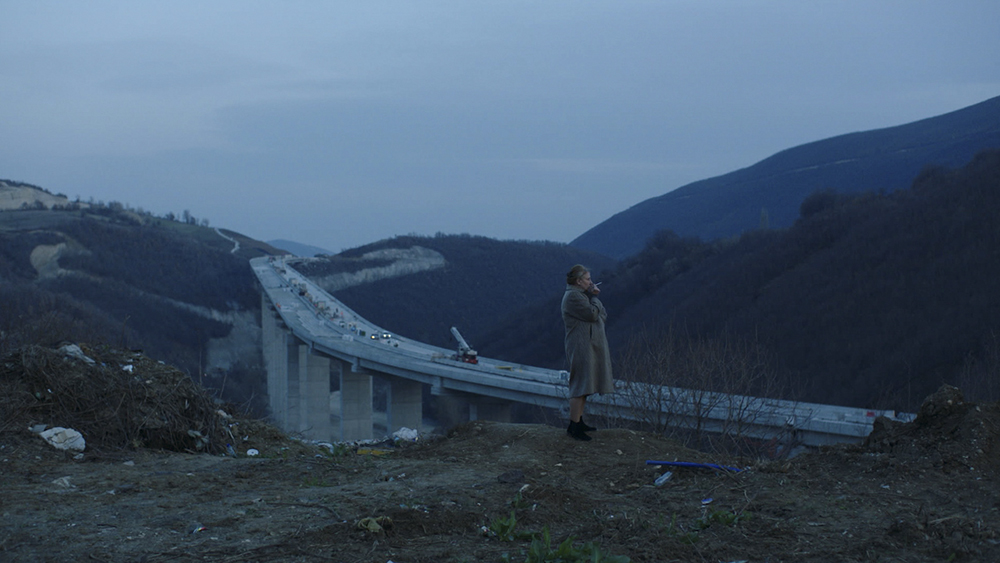
Stills from the film "Vera Dreams of the Sea," written by Doruntina Basha and directed by Kaltrina Krasniqi. In the role of Vera: Teuta Ajdini Jegeni. The film had its world premiere in September 2021 at the Venice International Film Festival.
I see “The Finger,” “Everyone’s Gone” and “The Poisoning Project” as a trilogy, a conclusion of a cycle of documenting our experience as Kosovo Albanians.
The project “Everyone’s Gone” [working title] is a play that deals with genocide from the perspective of the people who are left behind, without answers, with nothing concrete to rely on and yet find the desire to move forward. In a way, the drama looks at what the life of a genocide survivor might look like. It started as a project with the Heartefact Fund in Belgrade, and is supported by Ibsen Scope from Norway. For now, since I’m still working on it, I don’t want to reveal more.
On the other hand, the “The Poisoning Project” [working title] is in its early stages. The drama deals with the poisoning of students in Kosovo in 1990. I remember very well when the poisonings happened and in this short drama I refer to them, but I refer to them exclusively as fragments of memories, without any connection between them. Because each time I ask myself what happened at that time, I have some images I saw on television, in combination with some words, some advice that my parents gave me, such as what I should do if I start smelling something at school and some words from my peers.
The first phase of the research was with doctors and students who were poisoned. These doctors were present at the health centers when the first children who were poisoned came. My personal experience as a child being exposed to such poisoning, my very fragmented memories, which now are starting to make some sense because I have been carrying them inside me all this time.
It is estimated that around 7,000 students were poisoned in 1990. This is one of, let’s say, the most controversial moments on which the least light has been shed, because it has been publicly denied so much, despite the fact that Albanians, like Hava [in “Stiffler], have constantly said “they have poisoned us.” This had no value in that whole institutional chain of the former Yugoslavia. What has been fascinating for me during the research is the work that the Albanian doctors did, lobbying to prove that this phenomenon happened and, secondly, meeting those people today and seeing that they are still traumatized about how their voice and their truth has never been recognized.
Does it seem to you that it is concluding a sort of a cycle?
I fear that I am opening up something else altogether, which looks a little further into the past and a little broader into the context.
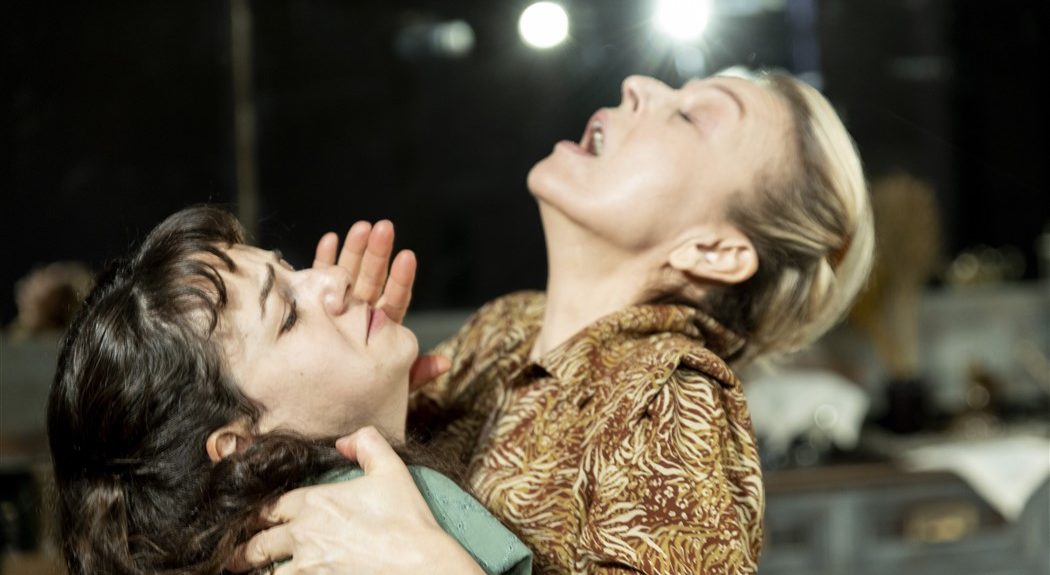
The play "The Finger" staged at the State Theater in Istanbul, directed by Bilge Emin. The play had its premiere there in December 2022, while it continues to be in the theater's repertoire. In the role of Zoja, Rüyam Perihan Dirin, in the role of Shkurta, Eylül İşcan
Photo: Ayşegül Karacan.
Now that you are talking about how you are turning back in time, it seems to me that that communication is constantly necessary, the conversation between Doruntina Basha as a playwright, screenwriter and as a little girl. How is that communication, that conversation, that tension? How many times do you have to call her, take by hand, and say, “Come here, I need you!” I am asking this question, which sounds so private, because it seems to me that in a context where official history is so polarized and public space and discourse do not invite curiosity and dialogue, we are forced to rely on our memories as a definitive truth.
Very often. Because for that little Doruntina Basha everything is quite clear, it is clearer to her than it is to me. During all that has happened, while that little girl has grown up to become me, we have had so many amplitudes in our history. In all the circumstances that have brought us here today, to me it’s not clear anymore what has actually happened in terms of human psychology.
I am a child of the ‘80s and a teenager of the ‘90s. I grew up and attended school in Prishtina during a period of violent police measures and an apartheid system. Remembering this time gives me chills of fear. I have many memories which, alone, without the context and knowledge I can offer today, do not make sense. So dialogue is necessary.
I believe it is important for anyone who reads this interview to understand the relationship between the author and their work, and the importance of the author’s presence in the rehearsal hall, on the set. How do you see yourself there? Secondly, I want to ask about abandoning your work, if it happens. When your work passes into the hands of someone else.
In the theater, drama remains drama, as a work of the author. It continues to live on even after all the stagings. I am OK with different interpretations of my texts by different directors and I even enjoy seeing their readings and approaches. I do not consider it as abandonment. On the contrary. It can be enriching to see all those different perspectives. Normally, I do not believe that a director, with a system of values, principles and political attitudes that are not in line with those of the drama, will take over the staging. At least I have not yet been faced with something like this.
I wouldn’t want to pass over your film project “Bleach.”
“Bleach” is the script for my second project with Kaltrina Krasniqi, with whom I worked on “Vera Dreams of the Sea.” As soon as we said goodbye to “Vera,” we had time to talk about other things. When “Vera Dreams of the Sea” had its premiere and started its festival journey, we were able to start the next project. The focus is on class issues among women. A large part of the first discussions I had with Kaltrina derived from our personal experiences, when we became parents for the first time, because this experience emphasizes very much how normalized and institutionalized inequality is in society, especially in relation to women and work.
“Bleach” is a project that I worked on with great enthusiasm and with pleasure. Due to the class confrontation, this report which in itself has a kind of absurdity, the project has offered me the opportunity to dive into some waters that I haven’t tried before, to play with some genre elements that, in the beginning of the project, I never thought would be an option. However, it is too early to reveal more. We are in the development process and we hope that soon we will start realizing the project.
What have you insisted on passing on to people through your experiences of sharing knowledge?
One thing that I try to convey is something that was deficient during my schooling and academic journey. I am aware that it can sound cliché, but I really think that is very necessary: no pupil, student, writing enthusiast, whether for theater or film, should hesitate or be discouraged by the creative impulses that come to them. Even if you think it’s not the right time, you should give it a chance, to explore it.
As I mentioned earlier, I don’t believe that impulses come by accident. Maybe they don’t come at the right moment, or, as I said, in the right medium, but they don’t come by accident. My generation had the misfortune of being educated and raised in a system where education simply did not have the opportunity to be a priority because of the systemic violence of power, which had been terrible and so constant. Consequently, cultivating individuality and encouraging original ideas was a kind of luxury and wasn’t able to be a priority. However, today, we should not continue with the same actions. It is time that everyone in this country has a proper future.
Feature Image: Majlinda Hoxha / K2.0
This article has been edited for length and clarity. The conversation was conducted in Albanian.
The content of this article is the sole responsibility of K2.0. The views expressed in it are the author’s and do not necessarily reflect the views of K2.0.
Curious about how our journalism is funded? Learn more here.






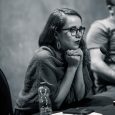
Dear, I'm Klara Van Es, Belgian documentary filmmaker and PhD researcher on Gender, identity and transition in Albania (at Luca School of Arts and KU Leuven). As part of my practical PhD research in arts, I'm also trying to reach out to kindred spirits, i.e. filmmakers, writers, ... who are willing to start a dialogue on issues that concern us both. So that we might enrich our mutual thinking and creating. I feel Doruntina Basha might be such a person. Would you please be willing to share a point/address of contact with me so that I could try and reach out to Mrs. Basha, please? I've been searching the net in vain. Many thanks and kindest regards, Klara Van Es